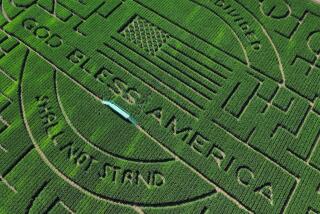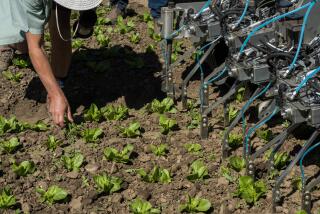A New Go-Round
In M. Night Shyamalan’s new sci-fi thriller, “Signs,” a Pennsylvania farmer played by Mel Gibson awakens one morning to discover a 500-foot geometric pattern that has mysteriously appeared in his cornfield overnight.
Opening Friday, “Signs” marks the first time that a major Hollywood studio--Disney’s Touchstone Pictures--has delved into the phenomena commonly known as “crop circles,” those sprawling and intricately designed geometric patterns that appear each summer in the picturesque fields of southwest England and elsewhere.
Long debunked by skeptics as the work of hoaxers, crop circles are about to get another moment in the sun--compliments of “Signs.” Media interest in the phenomena is higher than it has been in years, with an assortment of films, television programs, books, videos, magazine covers and newspaper stories focused on the topic timed to the release of Shyamalan’s film.
There are even plans by a Hartford, Conn., restaurant to sell “Crop Circle Beer” on tap, brewed from malted barley harvested in the same fields where many of the mysterious crop formations have appeared since the early 1990s.
As the film spawns renewed public curiosity in crop circles, it is also stirring up a ruckus among passionate devotees of the subject, true believers and skeptics alike.
“Anything that sort of ignores the truly high strangeness [of the formations] and the facts [surrounding them] and is basically working off the back of a phenomenon to do a Friday night thriller is, in the end, trivializing the phenomenon,” said Linda Moulton Howe, author of the book “Mysterious Lights and Crop Circles” and editor of an online science and environmental news Web site called www.earthfiles.com.
Others, who seek to debunk the phenomenon by using wooden planks to create hoax formations, see the Disney film as another case of Hollywood commercially exploiting the subject by infusing it with paranormal claptrap instead of offering a more rational explanation for why crop circles exist.
“What we are doing is propagating our belief system,” said London artist John Lundberg, who with two artist friends, Rod Dickinson and Wil Russell, claim to have been making crop formations in southwest England for the past 11 years. “We don’t want people to believe in extraterrestrials.”
Shyamalan, whose 1999 ghost thriller “The Sixth Sense” received six Academy Award nominations, including best picture and director, tries to downplay any controversy his film might engender.
“I think either side will be happy,” he said. “In the course of the movie, I try to give an explanation for what I think they are that will probably add to one more possible meaning.”
Gibson plays a former minister who initially believes the crop formation on his land is a prank; his disbelief parallels his loss of faith in religion. But later, as strange occurrences frighten his family, Gibson comes to believe that the formation has otherworldly aspects.
Asked what he believes is behind the crop formations, Shyamalan chooses his words carefully.
“It’s one of those funny, little, quirky oddities in the world,” he said. “Most people think they are bogus, but if only one of them is true, then you have something that is a real mystery.”
Those who follow crop circles say there are many theories advanced for why the formations have appeared, from psychic powers to satellite technology to unknown natural energies and, yes, pranksters.
They also say there are legitimate questions that beg more scientific research before the formations are dismissed as hoaxes. Why do the pictograms swirl clockwise and counterclockwise with the stalks of grain bent, but never broken or kinked? Why have so many people reported seeing strange “balls of light” hovering over the fields just before the patterns appear? What are the crackling sounds that have been associated with many crop circles?
Media interest in crop circles had waned in recent years, especially after two British men, Doug Bower and Dave Chorley, claimed in a 1991 interview that they were responsible for making the formations in England using planks and ropes.
Now, with Disney’s movie coming out, Colin Andrews, a leading crop circle researcher and lecturer from Branford, Conn. who served as a consultant on the film, said he has been inundated with requests for interviews by news organizations and TV shows.
“I just did a piece for Russian television this morning, and yesterday we did the Discovery Channel,” Andrews recently said, adding that the Learning Channel, the History Channel and the ABC newsmagazine “20/20” also have talked to him.
Andrews does not dispute that many of the formations are the work of humans. Indeed, of those circles he studied in 1999 and 2000, Andrews estimated 80% were man-made.
“That did leave 20% where there were no signs of people having made tracks into these geometric [patterns],” Andrews said. Meanwhile, a two-hour documentary titled “Crop Circles: Quest for Truth,” is scheduled to open Aug. 23 at the Nuart theater in West Los Angeles. Filmed by William Gazecki, whose 1997 documentary “Waco: The Rules of Engagement” shined a harsh spotlight on the FBI’s siege of the Branch Davidian compound in Waco, Texas, this new film, he said, will seek to answer the skeptics. His film includes interviews of at least two dozen eyewitnesses who give accounts of an invisible force coming out of nowhere in otherwise calm conditions and spinning the crops down within seconds.
“Look at the basic numbers, and then job it out like any construction job,” Gazecki said. “Look at how many man-hours it would take, then what planning and execution it requires, and all with no mistakes, no half-done ones, and the nights in England in summer are only 4 1/2 or five hours long. It takes me five hours to draw one of these things. How do they do it with ropes and planks in the dark?”
At the same time, British director Marcus Thompson is shopping a new independent film to distributors called “A Place to Stay.” The romantic drama was filmed in and around Wiltshire, England, and uses crop circles as a key plot device. Although they first appeared as crude circles in the 1970s, crop formations have grown more elaborate each summer. Some patterns are as intricate as snowflakes. Others resembled serpents or ziggurats. One formation discovered in July 1996, called the “Triple Julia Set,” spiraled nearly 1,000 feet and consisted of about 700 circles.
Tim Carson, who owns a 2,200-acre farm in Wiltshire, said one appeared in August on his farm that still defies easy explanation. Called the “Galaxy Spiral Arm,” it consisted of 409 circles and spread over 11 acres of wheat in an area of his farm called Milk Hill, about 15 miles from Stonehenge.
“You couldn’t really make it out from the ground,” Carson recalled, noting that whoever created the crop pattern managed the feat in a few hours over undulating ground. It was also a drizzly evening, he noted, when “clouds were sitting on top of the hill.”
The farmer noted that no one heard or saw anything that night. “I would love to see them do that,” Carson remarked.
But hoaxers say the trick isn’t that difficult.
“All you need is a pencil, a compass and a ruler to design it on paper,” explained Matthew Williams of Bishop’s Cannings, a village in England’s crop circle country, who was arrested in connection with trespassing on a farmer’s land last year while on his way to make a crop circle.
Californian Peter Sorensen, a videographer who claims to have made about a dozen crop formations with a small team of friends over the years, said they use a computer to create the elaborate patterns, then head into the fields and use “stomping boards” to press down the grain stalks.
Hoaxers and believers alike claim to have seen strange sights while standing out in the fields of Wiltshire at night.
Ron Russell, president of Midwest Research in Aurora, Colo., who travels to England each summer to conduct experiments on new crop circles, said he and others have been in the fields at night when “balls of light” appear.
“We don’t know what they are,” Russell said. “The best sighting I ever had was hard to explain. The first thing I saw, it was on the horizon. It was like a planet, but too bright to be a planet. Suddenly, without warning, it accelerated and was moving with great speed. It went straight above us. We saw it go bright and dim and must have winked out in the clouds. We were all going, ‘What was that?’ ”
More to Read
The biggest entertainment stories
Get our big stories about Hollywood, film, television, music, arts, culture and more right in your inbox as soon as they publish.
You may occasionally receive promotional content from the Los Angeles Times.










